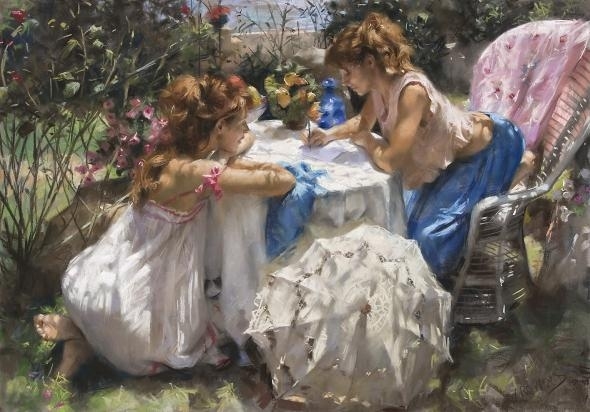kevin Kern-Childhood remembered

Leonid Afremov Art
Excerpts from Essay on Friendship
We have a great deal more kindness than is ever spoken.
Maugre all the selfishness that chills like east winds
the world, the whole human family is bathed with an
element of love like a fine ether. How many persons we
meet in houses, whom we scarcely speak to, whom yet we
honor, and who honor us! How many we see in the street,
or sit with in church, whom, though silently, we warmly
rejoice to be with! Read the language of these wandering
eye-beams. The heart knoweth.
The moment we indulge our affections, the earth is
metamorphosed; there is no winter, and no night; all tragedies,
all ennuis, vanish, — all duties even; nothing fills
the proceeding eternity but the forms all radiant of beloved
persons. Let the soul be assured that somewhere in
the universe it should rejoin its friend, and it would be
content and cheerful alone for a thousand years.
My friends have come to me unsought. The great God gave
them to me. By oldest right,
by the divine affinity of virtue with itself, I find them,
or rather not I, but the Deity in me and in them derides
and cancels the thick walls of individual character,
relation, age, sex, circumstance, at which he usually
connives, and now makes many one. High thanks I owe you,
excellent lovers, who carry out the world for me to new
and noble depths, and enlarge the meaning of all my thoughts.
Ralph Waldo Emerson
(1803-1882)

In poetry, and in common
speech, the emotions of benevolence and complacency which
are felt towards others are likened to the material effects
of fire; so swift, or much more swift, more active, more
cheering, are these fine inward irradiations.
From the highest degree of passionate love, to the lowest
degree of good-will, they make the sweetness of life.

Our intellectual and active powers increase with our affection.
The scholar sits down to write, and all his years of meditation
do not furnish him with one good thought or happy expression;
but it is necessary to write a letter to a friend, — and,
forthwith, troops of gentle thoughts invest themselves,
on every hand, with chosen words.

What is so pleasant as these jets of affection which make
a young world for me again? What so delicious as a just
and firm encounter of two, in a thought, in a feeling?
How beautiful, on their approach to this beating heart,
the steps and forms of the gifted and the true!

I awoke this morning with devout thanksgiving for my friends,
the old and the new. Shall I not call God the Beautiful,
who daily showeth himself so to me in his gifts? I chide
society, I embrace solitude, and yet I am not so ungrateful
as not to see the wise, the lovely, and the noble-minded,
as from time to time they pass my gate. Who hears me, who
understands me, becomes mine, — a possession for all time.

Vicente Romero Redondo Art
A friend is a person with whom I may be sincere. Before him I may
think aloud. I am arrived at last in the presence of a man so real and
equal, that I may drop even those undermost garments of dissimulation,
courtesy, and second thought, which men never put off, and may
deal with him with the simplicity and wholeness with which one chemical
atom meets another.
If I was sure of thee, sure of thy capacity, sure to match
my mood with thine, I should never think again of trifles
in relation to thy comings and goings. I am not very wise;
my moods are quite attainable; and I respect thy genius;
it is to me as yet unfathomed; yet dare I not presume in
thee a perfect intelligence of me, and so thou art to me
a delicious torment. Thine ever, or never.
Yet these uneasy pleasures and fine pains are for curiosity,
and not for life. They are not to be indulged. This is to
weave cobweb, and not cloth. Our friendships hurry to short
and poor conclusions, because we have made them a texture
of wine and dreams, instead of the tough fibre of the human
heart. The laws of friendship are austere and eternal, of one
web with the laws of nature and of morals. But we have aimed
at a swift and petty benefit, to suck a sudden sweetness.

DEAR FRIEND:

We snatch at the slowest fruit in the whole garden of God,
which many summers and many winters must ripen. We seek our
friend not sacredly, but with an adulterate passion which
would appropriate him to ourselves. In vain. We are armed
all over with subtle antagonisms, which, as soon as we meet,
begin to play, and translate all poetry into stale prose.
What a perpetual disappointment is actual society, even of the virtuous and gifted!
The hues of the opal, the light of the diamond, are not to be
seen, if the eye is too near. To my friend I write a letter,
and from him I receive a letter. That seems to you a little. It suffices me.
It is a spiritual gift worthy of him to give, and of me to
receive.
Let your greatness educate the crude and cold companion.
If he is unequal, he will presently pass away; but thou art
enlarged by thy own shining.
It is thought a disgrace to love unrequited. But the great will see
that true love cannot be unrequited. True love transcends
the unworthy object, and dwells and broods on the eternal.

The good spirit of our life has no heaven which is the price
of rashness. Love, which is the essence of God, is not for
levity, but for the total worth of man. Let us not have this
childish luxury in our regards, but the austerest worth;
let us approach our friend with an audacious trust in
the truth of his heart, in the breadth, impossible to be
overturned, of his foundations.

The other element of friendship is tenderness. We are holden
to men by every sort of tie, by blood, by pride, by fear,
by hope, by lucre, by lust, by hate, by admiration, by every
circumstance and badge and trifle, but we can scarce believe
that so much character can subsist in another as to draw us
by love. Can another be so blessed, and we so pure, that we
can offer him tenderness? When a man becomes dear to me,
I have touched the goal of fortune.

Let him be to me a spirit. A message, a thought, a sincerity,
a glance from him, I want, but not news, nor pottage. I can get
politics, and chat, and neighbourly conveniences from cheaper
companions. Should not the society of my friend be to me poetic,
pure, universal, and great as nature itself? Ought I to feel
that our tie is profane in comparison with yonder bar of cloud
that sleeps on the horizon, or that clump of waving grass that
divides the brook? Let us not vilify, but raise it to that
standard.

It has seemed to me lately more possible than I knew, to carry
a friendship greatly, on one side, without due correspondence
on the other. Why should I cumber myself with regrets that
the receiver is not capacious? It never troubles the sun that
some of his rays fall wide and vain into ungrateful space, and
only a small part on the reflecting planet.
No comments:
Post a Comment